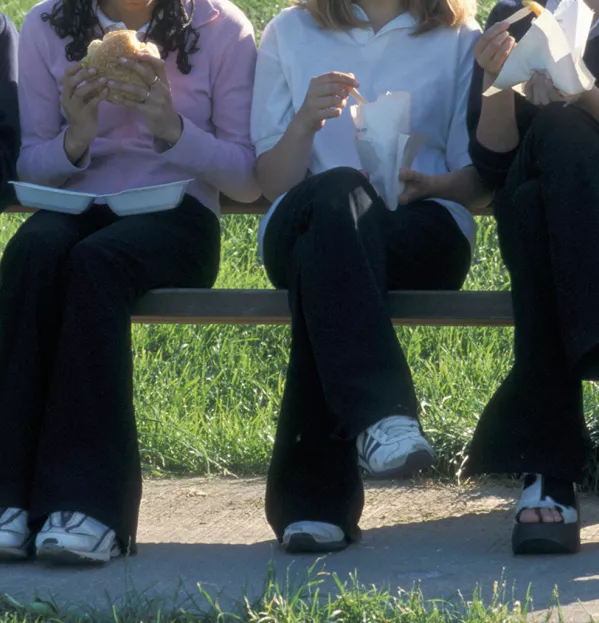The Clan leading the fight against Named Person

Scottish government plans could have led to children’s private information being shared if they were eating too many burgers - or not eating enough burgers - or watching too much TV.
These were some of the scenarios discussed by five Supreme Court judges who eventually ruled in 2016 that the government needed to think again about how it would implement its Named Person scheme, which aims to appoint a professional named person - often a teacher - to ensure the wellbeing of every child.
Those worrying examples stuck in the mind of Alison Reid because they summed up the concerns of her legal outreach charity, Clan Childlaw, which played a critical role in halting Named Person in its tracks.
It was the No to Named Person (NO2NP) coalition that made the appeal to the UK’s highest court in 2016 after its case was dismissed by the Court of Session in Edinburgh the previous year.
But the Supreme Court judgment ultimately said that Clan Childlaw’s legal intervention changed the focus of the debate.
The NO2NP group - which included the Christian Institute, Christian Action Research and Education (Care), Tymes Trust and the Family Education Trust - took issue with the whole initiative, describing Named Person as a “Big Brother scheme”.
Privacy ‘risk’
Clan Childlaw, on the other hand, is supportive of the concept of Named Person and “having a single point of contact for people to raise issues”, but the grounds for being able to share a child’s confidential information - as the Supreme Court judges’ musings demonstrated - were too broad and spurred the charity on to intervene in the case, says Reid. In an interview with Tes Scotland, Reid sums up her organisation’s take on a crucial failing of Named Person: “If a child thinks that as soon as they speak to an adult that everybody who has any kind of professional relationship with them is going to know about it, how can they ever explore any issues? The [other] example the Supreme Court gave was of going to see a doctor: people need to be at least able to express concerns and work things out without that being passed on.”
Now Reid warns that if the government continues to try to legislate to fix the problem identified by the Supreme Court, it is likely to leave itself open to more legal challenges.
The government brought forward its Children and Young People (Information Sharing) (Scotland) Bill last year but it has hit a stumbling block - the Scottish Parliament’s Education and Skills Committee has refused to produce a report on it until the government provides a draft code of practice. The upshot is further delays.
Clan Childlaw is not happy with what is being proposed. Instead of continuing doggedly down this path, the Scottish government, Reid believes, should withdraw the Bill and “give practitioners what they need: clear, robust and accessible national guidance and a way forward that everybody can follow”.
‘Clear’ guidance
The government has already produced guidance on difficult issues such as underage sex, she argues, using case studies and different scenarios to address tough topics, including when consensual underage sex becomes a child-protection issue.
Reid set up Clan Childlaw 10 years ago in a bid to make the law more accessible to young people. The team of eight solicitors works differently to other lawyers, she says, by meeting young people where they feel comfortable - in schools, their homes, the local café - and trying to offer a more “holistic” service.
It deals with around 250 cases a year and answers around 450 enquiries. The majority of its caseload - around 80 per cent - involves looked-after children. These are children whom we as a society are failing, Reid says.
In particular, she believes that the problem of looked-after children losing touch with their siblings needs to be addressed. It is an issue that she thinks will soon be brought to the fore because of the ongoing independent care review.
One teenager sticks in Reid’s mind. She met her at a youth café where she was running a drop-in. The girl rolled up her sleeve to reveal a name tattooed on her arm and asked Reid, “Can you help me find him?” It was her younger brother’s name.
“It’s the longest-lasting relationship and we haven’t given it enough thought,” says Reid.
Clan Childlaw tried to get a duty to promote sibling contact into the 2014 Children and Young People Act - the law that introduced Named Person. However, the amendment was thrown out - as was another amendment the team put forward, stating that children’s information should only be shared under Named Person with their consent. Reid says: “We tried everything. We exhausted every possibility. We knew there was a problem.”
On Named Person more generally, however, a conclusion to this long-running story seems some way off - meaning that work may still be lying ahead for Clan Childlaw.
You need a Tes subscription to read this article
Subscribe now to read this article and get other subscriber-only content:
- Unlimited access to all Tes magazine content
- Exclusive subscriber-only stories
- Award-winning email newsletters
Already a subscriber? Log in
You need a subscription to read this article
Subscribe now to read this article and get other subscriber-only content, including:
- Unlimited access to all Tes magazine content
- Exclusive subscriber-only stories
- Award-winning email newsletters